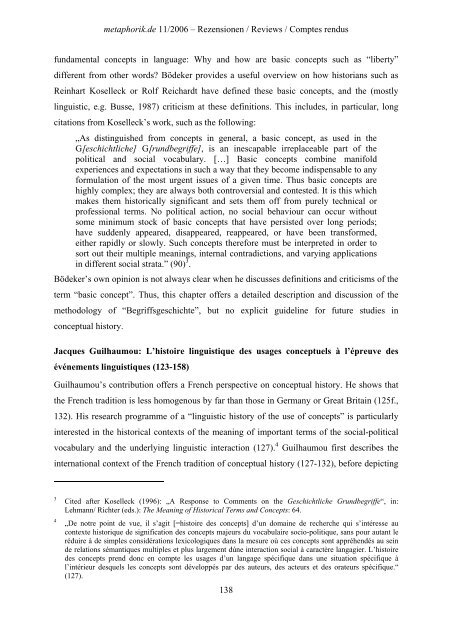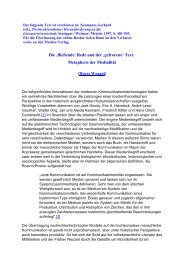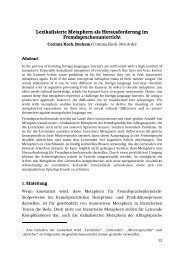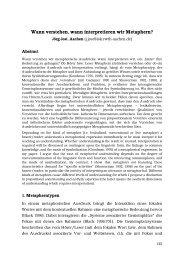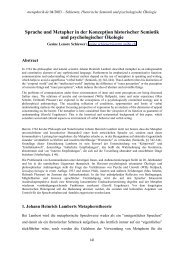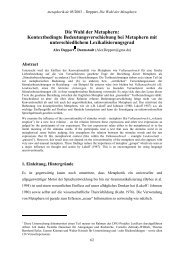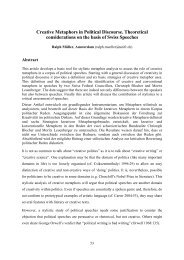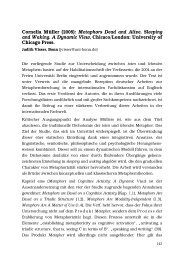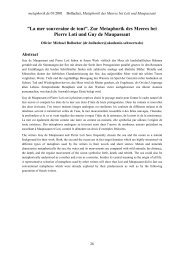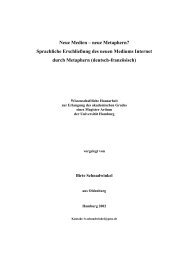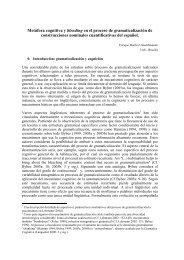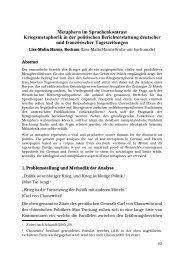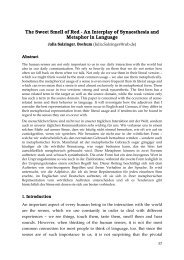Hans Erich Bödeker - metaphorik.de
Hans Erich Bödeker - metaphorik.de
Hans Erich Bödeker - metaphorik.de
Create successful ePaper yourself
Turn your PDF publications into a flip-book with our unique Google optimized e-Paper software.
<strong>metaphorik</strong>.<strong>de</strong> 11/2006 – Rezensionen / Reviews / Comptes rendus<br />
fundamental concepts in language: Why and how are basic concepts such as “liberty”<br />
different from other words? <strong>Bö<strong>de</strong>ker</strong> provi<strong>de</strong>s a useful overview on how historians such as<br />
Reinhart Koselleck or Rolf Reichardt have <strong>de</strong>fined these basic concepts, and the (mostly<br />
linguistic, e.g. Busse, 1987) criticism at these <strong>de</strong>finitions. This inclu<strong>de</strong>s, in particular, long<br />
citations from Koselleck’s work, such as the following:<br />
„As distinguished from concepts in general, a basic concept, as used in the<br />
G[eschichtliche] G[rundbegriffe], is an inescapable irreplaceable part of the<br />
political and social vocabulary. […] Basic concepts combine manifold<br />
experiences and expectations in such a way that they become indispensable to any<br />
formulation of the most urgent issues of a given time. Thus basic concepts are<br />
highly complex; they are always both controversial and contested. It is this which<br />
makes them historically significant and sets them off from purely technical or<br />
professional terms. No political action, no social behaviour can occur without<br />
some minimum stock of basic concepts that have persisted over long periods;<br />
have sud<strong>de</strong>nly appeared, disappeared, reappeared, or have been transformed,<br />
either rapidly or slowly. Such concepts therefore must be interpreted in or<strong>de</strong>r to<br />
sort out their multiple meanings, internal contradictions, and varying applications<br />
in different social strata.” (90) 3 .<br />
<strong>Bö<strong>de</strong>ker</strong>’s own opinion is not always clear when he discusses <strong>de</strong>finitions and criticisms of the<br />
term “basic concept”. Thus, this chapter offers a <strong>de</strong>tailed <strong>de</strong>scription and discussion of the<br />
methodology of “Begriffsgeschichte”, but no explicit gui<strong>de</strong>line for future studies in<br />
conceptual history.<br />
Jacques Guilhaumou: L’histoire linguistique <strong>de</strong>s usages conceptuels à l’épreuve <strong>de</strong>s<br />
événements linguistiques (123-158)<br />
Guilhaumou’s contribution offers a French perspective on conceptual history. He shows that<br />
the French tradition is less homogenous by far than those in Germany or Great Britain (125f.,<br />
132). His research programme of a “linguistic history of the use of concepts” is particularly<br />
interested in the historical contexts of the meaning of important terms of the social-political<br />
vocabulary and the un<strong>de</strong>rlying linguistic interaction (127). 4 Guilhaumou first <strong>de</strong>scribes the<br />
international context of the French tradition of conceptual history (127-132), before <strong>de</strong>picting<br />
3 Cited after Koselleck (1996): „A Response to Comments on the Geschichtliche Grundbegriffe“, in:<br />
Lehmann/ Richter (eds.): The Meaning of Historical Terms and Concepts: 64.<br />
4 „De notre point <strong>de</strong> vue, il s’agit [=histoire <strong>de</strong>s concepts] d’un domaine <strong>de</strong> recherche qui s’intéresse au<br />
contexte historique <strong>de</strong> signification <strong>de</strong>s concepts majeurs du vocabulaire socio-politique, sans pour autant le<br />
réduire à <strong>de</strong> simples considérations lexicologiques dans la mesure où ces concepts sont appréhendés au sein<br />
<strong>de</strong> relations sémantiques multiples et plus largement dúne interaction social à caractère langagier. L’histoire<br />
<strong>de</strong>s concepts prend donc en compte les usages d’un langage spécifique dans une situation spécifique à<br />
l’intérieur <strong>de</strong>squels les concepts sont développés par <strong>de</strong>s auteurs, <strong>de</strong>s acteurs et <strong>de</strong>s orateurs spécifique.“<br />
(127).<br />
138


